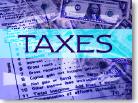|
Beware the 'Net tax bandits
|
 |
March 23, 1999: 12:10 p.m. ET
Tax protesters may sound convincing but fighting the IRS is a losing battle
|
NEW YORK (CNNfn) - It started out innocent enough.
"Steve," a real estate broker in Southern Colorado, picked up a few books on the origin of federal tax law. He surfed the 'Net in his free time, finding dozens of Web sites that told him his rights were being violated each time he filed his tax returns.
And in 1992, he joined the Save-A-Patriot Fellowship in Westminster, Md., a group that openly disputes the constitutionality of the current tax code.
Steve, who asked not to be named, stopped filing his taxes that same year and started fighting the federal government. He lost more than just his case.
"It's not just economically crippling, but there's emotional stress you go through because you gain a deep belief that what you are doing is for the good of the country and the good of your grandchildren," he said. "But the Internal Revenue Service carries a big hammer and the whole time you are worried about what they can do to you and your family."
Steve settled his debt with the state of Colorado this year and is working out a repayment plan with the IRS. But it won't be easy.
On top of the $200,000 lien the IRS has on his name, Steve said he spent another $10,000 to $15,000 trying to defend his case over the last seven years. Most of that money was collected by the "Patriots" in fees, he said.
"You sign over power of attorney to them and every time they write a letter to the IRS on your behalf they charge you $45," he said. "When you are doing 10 or more a month it adds up fast. They made a bunch of bucks off of me."
(Repeated attempts to contact the Save-A-Patriot Fellowship were unsuccessful.)
Even now, though, Steve does not call himself a protester. He says he's not opposed to the concept of taxes, just to the way the income tax laws have been "misapplied" in the United States. He calls himself a Christian and a patriot. And he says he still believes in the Save-A-Patriot Fellowship's mission.
"They are very convincing and I'm not so sure they're not right, but I am sure that I can't take it and that it's not worth it," he said. "I'm bust. I'm pretty much starting over at age 44. I would never advise anyone to do what I did."
Destroying lives
Tax protesters are nothing new to the Internal Revenue Service. From the time income taxes were implemented in 1913, there have been those who challenge their constitutionality.

Most genuinely believe, and practice, what they preach. But they also frequently land new recruits into a heap of trouble.
And as use of the Internet grows, tax professional say, so too has the ability of these IRS agitators to market their pitch.
"More and more people have access to computers and when you use the Internet you are going to find these jerks," said Alvin Brown, a tax attorney and former office manager for the Chief Counsel's office with the Internal Revenue Service. "I would say it's growing and what sickens me is that these people are making money doing this."
Most organizations and authors of books touting tax protesting are smart enough to include disclaimers, saying they are not responsible for how you use their information.
That way, when you stop paying your taxes or make outlandish claims on your return, you are on your own.
"These are bad guys because they ruin lives," Brown said. "There are a lot of them out there on the Internet."
Worse yet, they are becoming proactive, tracking down e-mail addresses and sending out unsolicited propaganda, in hopes of selling their books, videos and information kits.
"One of the things about the Internet is that anybody can put anything up there," Brown said. "There's a lot of untested, unfiltered information out there."
He added that many of these self-claimed protesters aren't actually protesters at all.
"Some are out there just to separate the suckers from their money, while they turn around and file perfectly good tax returns for themselves," he said.
Currently, Brown said he's busy bailing out one of his clients who stopped paying taxes after purchasing an information packet from one of these groups for $700. Another client, a university professor and one-time tax protester, receives just $363 out of his monthly paychecks to live on, since the IRS levies the rest of his salary to cover his unpaid taxes.

"I'm starting to get very sophisticated questions about the tax law from middle income taxpayers (who are reading these Web sites)," Brown said. "They send me e-mails, citing Supreme Court cases, and they try to challenge me. I respond back to all of them that they are being sold a bucket of poison."
IRS
Most tax protesters attempt to support their case with civil rights, saying that having to file a Form 1040 violates the Fourth Amendment right to privacy and/or the Fifth Amendment right against self-incrimination.
Others use the Freedom of Religion clause as a springboard to tax evasion. In one common scheme, the individual taxpayer obtains minister's credentials for a church or religious order by mail.
From there, they establish a new organization that claims to be a religious organization and they take a vow of poverty, assigning their assets and income to the new organization.
Still others, claim the income tax code, as it currently is written, only entitles the government to collect taxes from those who file returns. Or that the existing tax law does not apply to U.S. citizens living and working in the 50 states.
The IRS has heard it all. And, for the most part, so have the courts.
"These [Web] sites claim that somehow the tax law isn't constitutional, or that wages aren't technically income, or that the 16th Amendment, (which gives Congress the power to collect income tax), was never properly ratified," said IRS spokesman Don Roberts. "But these arguments have been tested in the courts and they lose consistently. There's quite a volume of case history on this, enough to end anybody's questioning."
As for the argument that American citizens have a constitutional right to keep their income private, Roberts said the Amendment to which these protesters refer actually states that you have a right to keep private the source of your income. You must always, in all circumstances, disclose the sum of your income.
"The usual caveat applies: if it sounds too good to be true, it probably is," Roberts said.
If you fail to file your taxes, or insist on paying only a small portion of what you actually owe, you'll face a slew of possible ramifications, both civil and criminal.
If you file your return but refuse to report all of your income, for example, you could be looking at a misdemeanor charge with a maximum penalty of 1 year in prison and a fine of $25,000 (plus the cost of prosecution).
Evading taxes altogether is a felony offense with a maximum 5 year prison sentence and fine of $250,000. And filing a false statement, or a tax return you know to be inaccurate, could earn you 3 years in prison and a $250,000 fine under penalties of perjury.
Widespread deceit
A study cited last year found that 47,000 illegal tax protesters owed more than $540 million in taxes - or 2.3 percent of the total accounts receivable due from individuals.
But "Steve," who had ringside seats to this underworld for seven years, said he believes the number of non-filers is actually much higher.
"If you really got into this you'd be shocked," he said. "There are millions."
(Click here for the facts on tax protesting)
I fought the law…
As an American citizen, you have the right to question the law and even challenge its constitutionality.
But tax professionals and the IRS say you should use the appropriate channels to do so, either take it up with your Congressional representative or fight the law in court.
Under no circumstance, they say, should you stop filing or paying your taxes.
As Steve will tell you, it's not worth it in the end.
"Based on the writing of the tax code, it's very easy to believe that the 1040 form is not something that the American citizen has to fill out, or that it only applied to federal employees or businesses, or people who create income through alcohol, tobacco or firearms," he said. "I still believe there is validity there, but the point is, you are not going to beat 'em." 
--by staff writer Shelly K. Schwartz
|
|
|
|
|
 |

|

